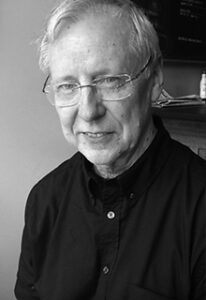Review: The Vocation of Poetry
At the end of the second section of the extended lecture from which this short volume takes its title, Durs Grünbein says that he “might even go so far as to say that poetry is in large part born from the desire to start over as often as possible.” Whether or not this is true of poetry itself—though the author’s proof of it seems convincing enough—it is most certainly true of Grünbein’s writing about his writing life, as the book’s first essay begins by attributing the origin of his interest in making poems to time spent with his grandfather, a well-known (to the editors of several East German newspapers, at any rate) crossword-puzzle maker, while the aforementioned lecture claims that “it all started with a noise—a not at all harmless noise—more of an acoustic irritation,” at which point he begins to describe what seems to be the writing of his first poem.
This discrepancy hardly matters, of course, for if one is daft enough to assume that poetry is one’s vocation, then one is likely to say “Very well then!” when confronted with contradiction, whether minor or major. Art being a rather continuous and all-consuming calling, how difficult it would be for any artist to offer up the exact moment or impetus that led to his or her desire or aptitude for making. As Allen Grossman writes, “Every signifier of ‘first experience,’ such as ‘creation’ or ‘vocation,’ is also a figure of the forgetfulness of no beginning.”
What’s most refreshing about Grünbein’s takes on poetics is his skepticism of poetic theories, which comes off as frank and useful rather than cantankerous or partisan. If, for instance, certain aesthetic camps have felt compelled to delve deeply into the poet’s personal life, while others have railed against the same, Grünbein’s position—“Verse is the integral of personality”—seems as applicable to the poems of, say, Frederick Seidel, as it does to those of Susan Howe. If there are a handful of claims here that I’m sure I’ve heard before (e.g., “Poetry puts language into a dream state”), there are far more that make me stop, look up, and listen to what Grünbein has just said. To wit, this riff on the poetic tradition and individuality: “For all its forays into complex harmonics and combinatorics, poetry will never be able to shake its proximity to the simple instrumental composition…Poetry is a solo-voice affair.” Given the endless declarations with regard to the imagination’s endlessness, it’s helpful to be reminded of the practical limits of a particular mode of creation. Moreover, while recent essays asserting poetry’s importance seem as ubiquitous as those deeming it irrelevant—a situation which threatens to reduce the entire matter to a tedious stalemate—I find Grünbein’s challenge to Eliot’s notion that “[p]oetry doesn’t matter” to be one of the most unique (and readable) arguments to the contrary.
In the book’s last essay—a speech delivered on the occasion of being awarded the Order Pour le Mérite—Grünbein writes: “Poetry has literally changed my life by instructing me on how to use my allotted time in a meaningful way.” While it’s likely that this statement feels obvious to anyone who has taken up the reading and/or writing of poetry with any seriousness, its obviousness hardly diminishes its force. Like a good poem, this assertion—like many others herein— gives sound and shape to something many have felt but which few have yet been brought to say.

